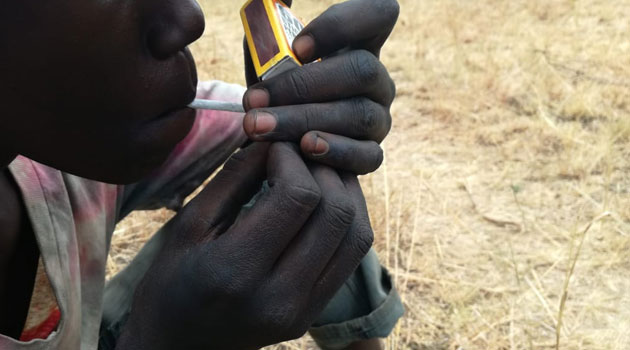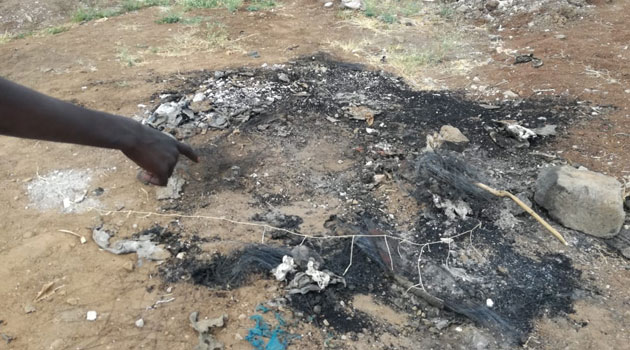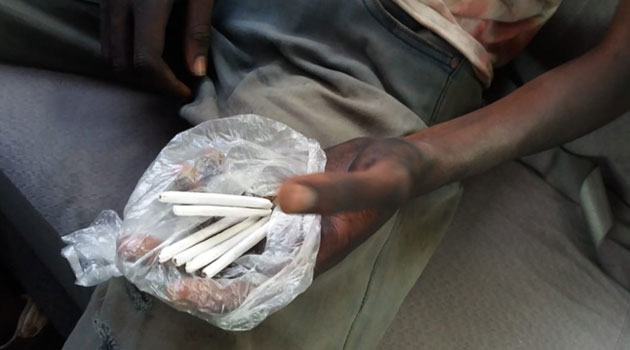
“When doing this, we are usually alive to the fact that it is either our way or their way, which could mean death”/JOSEPH MURAYA
NAIROBI, Kenya, Mar 28 – Kevo alias Kudenga stabbed Tabitha Muthoni, a first-year Jomo Kenyatta University of Agriculture and Technology (JKUAT) student to death on February 7, as established by the Capital FM Investigative team.
Kudenga who wanted to steal Muthoni’s phone and that of her friend drew his dagger and stabbed her twice on the neck and left side of her chest near the heart, according to police reports.
Muthoni joined what has become a growing list of victims of insecurity within the proximity of one of Kenya’s finest institutions of higher learning.
About a month after Muthoni’s death, the ashes where Kudenga was torched during a botched attempt to snatch yet another student’s phone are still visible just next to an abandoned quarry.
Kudenga had agreed to an interview with us but he never made the appointment after he was mobbed to death.
Three other accomplices of Kudenga have since been burnt on the same spot – young teenage thugs, all who have never seen the four walls of a secondary school classroom but are driven by the urge to satisfy an unending thirst for quick cash.
“When doing this, we are usually alive to the fact that it is either our way or their way, which could mean death,” Kudenga’s accomplice only identified by his nickname Bazenga said during an interview with this reporter at their dingy hideout.
The day Kudenga met his death, he had stabbed a JKUAT male student on the neck in an attempt to snatch his phone but he was overpowered.
The student pushed him hard and he fell on the ground hitting a stone with his head.
The altercation attracted a mob that burnt him to death while the student narrowly survived the stab wound.

The ashes where Kudenga was torched during a botched attempt to snatch yet another student’s phone are still visible just next to an abandoned quarry/JOSEPH MURAYA
-The day Muthoni was stabbed to death-
At the scene where Muthoni breathed her last, the flowers and palm trees planted along the perimeter wall of a famous Juja restaurant located along a dusty road off the Thika Superhighway are thriving despite the scorching sun.
On this dusty road leading to Gachororo village, her tender life was lost.
Bazenga told this reporter that Muthoni was taking a selfie while in the company of a friend when they ambushed them.
“She tried to resist,” he said.
The first year’s death added to the list of JKUAT students’ lives lost within a span of 12 months but tens others are surviving with stab wounds – some have reported to the police while many others don’t as they have resigned to fate.
Link of hard drugs in the stabbings
Interaction with some of the gang members revealed chilling details of young people willing to go the extra mile, including killing, to get what they want.
It is Bazenga and Rider who agreed to tell their story and that of others under the influence of hard drugs and the price they must pay “to remain high.”
Most of them were either half asleep, dizzy or were not interested, but our source who is “respected” among his circles ensured they were present.
A costly venture in all sense. To get ‘high’ one is required to spend at least Sh2,000 per day.
This means in a week, peddlers of the hard drugs pocket a cool Sh14,000 from each of the gang member translating to Sh56,000 per month.
Their customers range from the gang members to students and other members of the public.
“Two sniffs of heroine go for Sh150. To get high, we usually lace it with bhang, which is also our main source of income when we are not stealing,” Bazenga said as Rider nodded in agreement.
Rider has a fractured hand which will not heal anytime soon since he abandoned hospital after the urge for heroine came calling.
It is the drugs, he said, that help him numb the pain.
He was given the nickname Rider for his ability to steal, snatch phones and so on despite having a wounded hand.
His front teeth are missing.
“I have been beaten to the point of death,” Rider said, with a sense of pride, calling himself, “the cat with nine lives.”
His body is ‘tattooed’ with healed and fresh marks resulting from his encounters with law enforcers and ‘mob justice’.
After the death of their colleagues, the gang has gone ‘low’, they said, until the public rage cools down.
“Maybe after two weeks, we shall be back to our hustle but for now, we are just selling bhang,” Bazenga said while opening his palm to show some of the rolls wrapped in a polythene paper.
Death has never scared us
Throwing up blood, shaking and being dizzy defines their lives without a puff of weed laced with the heroine.
It is in this mental status that the thugs usually in groups of 10 hit the streets mostly over the weekend when most of the students are partying.
Once settled on a prey, they said, “there is no turning back. It is either their way or ours, we can get killed but that has never scared us.”
Bazenga seems to be the most hardened of the three.
“We never commit any wrong. We are just hustling,” he says with a faint smile.
He has lost count of the number of his accomplices who have been killed and buried in Kiandutu Cemetery but he is a slave and can’t just free himself.
He, however, has a soft side.
“I would like to be an engineer if I will ever come out of this alive,” he said, but he won’t accept to go back to his primary school and get his KCPE results slip.
“Hio ni shule ya machizi (that is a school of mad people),” he added while making mean reference to his primary school.
Going with their testimonials, getting bhang and heroine is as easy as ABCD, despite the place they get it being less than five kilometres from Juja Police Station.
One of the places is called Harlem, just at the heart of Gachororo.
A spot check revealed tens of youths idling there while smoking bhang, chewing muguka as they chat the sunny day away with rudderless stories.
And a common trait, they were all mean looking and nervous. At some point, they sent someone to trail us, but we opted to leave for fear of our safety.
Are police aware of what goes on here? If so, why have they not acted?

A costly venture in all sense. To get ‘high’ one is required to spend at least Sh2,000 per day/JOSEPH MURAYA
Some of the gang members admitted to have bribed the police several times in an exchange for their freedom.
“The first time I bribed an officer with Sh800, the second time with a thousand bob,” Bazenga claimed.
Rider too made similar allegations, which if true, will only dim the hope of the country’s future leaders of having a secure learning environment.
Women gang ‘Chinja ua’
Chinja ua (slaughter kill) – their code name – is the women faction of the gang, whose main target is their own – women.
Like men, they walk in groups of 10 while armed with knives.
“Ni hustle tu kama yako (it is just work, just like yours),” a dreadlocked lady, a member of the brutal gang said.
She was way too intoxicated to sustain a meaningful conversation.
She dozed off as other members shied off from speaking to this reporter.
According to Bazenga, the ‘Chinja ua’ gang recently proved ‘what men can do women can do better’ when they attacked two men, stole their personal belongings and even undressed them.
“Pia wao ni nomare (them too are lethal),” he said, his voice carrying some sense of pride.
-Hope amidst none-
I caught up with Bruce Byron inside the institution as he rushed to sit for an examination.
Byron is the newly elected Jomo Kenyatta University Student Association Secretary-General and is full of optimism that the worrying trend will be reversed.
This, he attributed to what he termed as increased police patrols around the school.
But will this address the root cause of the problem?
Who will stop the teenage addicts, who just want to be intoxicated?
“The truth is that there have been cases (of stabbings) following each other and we didn’t expect this to happen,” Byron said.
His hope and that of thousands of students residing outside the institution is pegged on the police word- “we are in control of things.”
He said the government can provide a lasting solution by increasing the capacity of the institution’s accommodation and that of other universities.
“This is not a JKUAT problem alone,” he asserted.
Only a meagre 2,000 students are accommodated within the institution, with tens of thousands others left out.
The newly posted Juja Police boss Dorothy Migarusha said she cannot tell whether there is a link of hard drugs to the recent stabbings as established by Capital FM News since investigations are still in an “active stage.”
A story told so many times.
“There is no closing of a file until we have an outcome,” she said of the ongoing investigations.
But then added that “we cannot just wish it away. It is also our concern.”









































